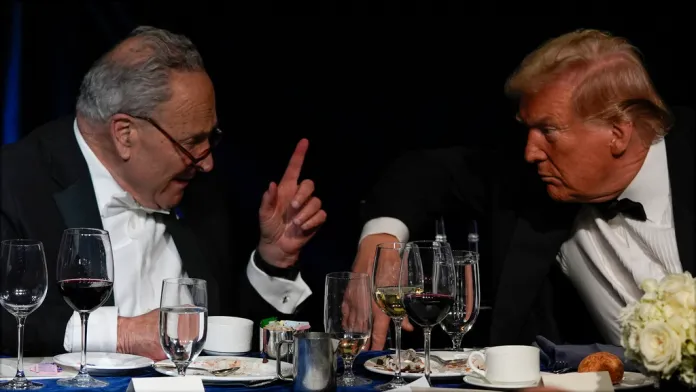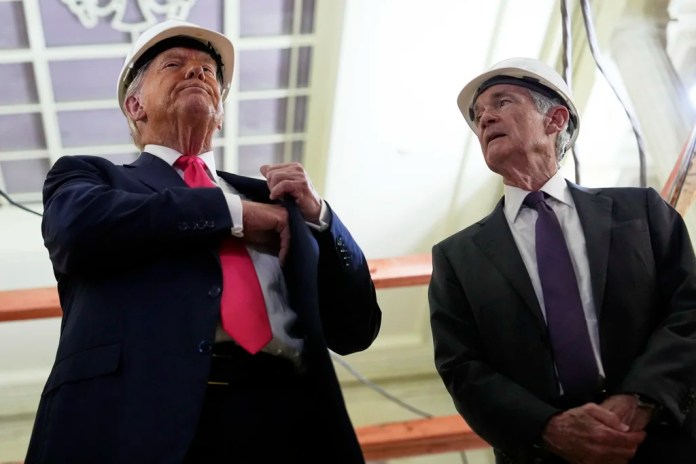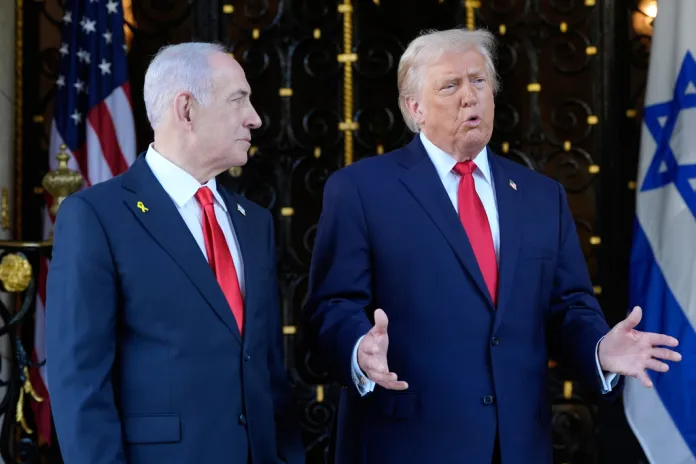Harris and Trump to get cornered on policy at Philadelphia debate – Washington Examiner
The upcoming debate in Philadelphia between Vice President Kamala Harris and former President Donald Trump is poised to be a critical moment for both candidates just eight weeks before the November election. This face-off is notable as it may be their first and only opportunity to discuss their policies directly with voters.
Harris is under pressure to clarify her policy positions, having faced criticism for her limited media interactions since taking the Democratic Ticket from President Biden. She has outlined some economic initiatives, like financial aid for first-time homebuyers and tax incentives for startups, but remains vague on several other significant issues, including certain progressive topics. Her strategy appears to involve pivoting toward centrist views, which risks alienating her liberal base.
On the other hand, Trump has been more accessible to the media, yet he too is challenged by the need for clear policy details, especially concerning key election issues such as abortion. He has provided contradictory statements on this topic, sometimes indicating he would not support a federal ban, yet not entirely dismissing potential restrictions on abortion rights.
The debate, hosted by ABC News, will focus on critical issues like the economy, abortion, and immigration, providing a chance for each candidate to define the other and articulate their visions. Harris’s challenge will be to establish her identity as a candidate and present a coherent agenda without disaffecting her progressive supporters, while Trump must navigate his complex relationship with both conservative and independent voters. The stakes are particularly high for Harris, as polls indicate a significant portion of voters feel they need to learn more about her compared to Trump, who is already a well-defined figure.
Harris and Trump to get cornered on policy at Philadelphia debate
PHILADELPHIA — Tuesday’s debate between Vice President Kamala Harris and President Donald Trump could be the first and only time the two candidates will explain their policies to voters side by side.
As a result, the faceoff in Philadelphia will present a high-stakes moment for both White House hopefuls to pitch their agenda to voters just eight weeks before the November election.
Harris has been scrutinized for avoiding the press since she took over the Democratic ticket from President Joe Biden. She has sketched out some of her policy views but left many others unaddressed.
Meanwhile, Trump has been pressed for greater clarity on how he will handle one of the most potent election-year topics: abortion.
2024 PRESIDENTIAL DEBATE LIVE UPDATES: TRUMP AND HARRIS FACE OFF IN ABC SHOWDOWN
Each has found ways to encapsulate the policy stances of their opponent. Trump has dubbed Harris “Comrade Kamala” over the progressive views she held during her 2019 run for president, some of which she has abandoned. Harris, for her part, has tied Trump to Project 2025, a conservative “wish list” for a second Trump term that he has disavowed.
But the debate, hosted by ABC News, will give moderators a unique chance to zero in on specifics. Across 90 minutes, Trump and Harris will be peppered with questions on the issues that will decide the election, likely including the economy, abortion, and the border.
Harris tries to pivot right — without angering her base
Harris has slowly rolled out her policy agenda. Early on, she reversed her stance on a handful of progressive views she held during her first run for president, including a ban on fracking.
Since then, she has gone into detail on her economic plans, including financial assistance to first-time homebuyers and tax incentives for startups. On the border, she has embraced a bipartisan immigration deal Biden negotiated with the Senate.
But Harris has simultaneously left vague where she stands on a whole host of other matters. Until Monday, she did not have a policy page on her campaign website.
Harris has given mixed signals on whether she supports an electric vehicle mandate, which is of political significance to auto workers in Michigan, while her campaign won’t say if she supports, among other things, reparations for the descendants of slaves like she did in 2019.
The debate presents a rare opportunity to clarify her views. Harris has only sat for one interview with the press since she announced her run for president in late July.
But her challenge will be explaining her new stances, most of which are more centrist, without alienating liberal voters. In Harris’s late-August interview with CNN, she told viewers her “values have not changed,” even if some of her policy positions had.
Her willingness to get specific on some topics and not others suggests what Democrats perceive to be their biggest liabilities in November.
It is no longer popular to take a progressive view on immigration, like what Harris did in the 2020 primary, when she called for the decriminalization of border crossings. Her prior stance on fracking poses a danger to her prospects in energy-rich Pennsylvania.
But Harris has tried to signal that she will continue to be an ally to the Left. On her policy page, she expressed support for term limits on the Supreme Court, now controlled by a 6-3 conservative majority.
Meanwhile, she has imbued her economic messaging with the sort of populist rhetoric Sen. Bernie Sanders (I-VT), the de facto leader of the progressive movement, urged her to adopt before extending his endorsement.
She has blamed inflation on “corporate greed” and proposed caps on the price of groceries that Republicans have denounced as price controls.
Trump muddies the water on abortion
Trump has given the press far more access than Harris, in part to draw a contrast. But questions remain due to the scale of some of his policy proposals.
He has promised the “largest deportation effort” in America’s history if he is elected in November, but he has been light on the details when asked about how he would execute the removals.
Meanwhile, he has faced scrutiny over how he would pay for a raft of tax cuts that could add $4 trillion to the deficit over the next decade. On Thursday, he embraced a government efficiency commission proposed by X CEO Elon Musk.
The decision to gloss over details reflects a calculation from both Trump and Harris. Voters want to hear each candidates’ priorities and values, not the minutiae of how they would govern. In some cases, specificity can backfire, like in the case of Harris’s “price-gouging” proposal.
“I don’t believe either candidate feels like it’s in their best interest to go deep into policy,” Democratic strategist Stefan Hankin said.
But on one issue in particular, abortion, Trump has been forced to get specific.
He rewrote the GOP platform in July to leave the issue to the states. But when pressed on how far he is willing to pivot to the middle, he has sent mixed messages to voters.
In April, Trump said he would not sign a federal ban. Four months later, he would not commit to vetoing such a ban if it arrived on his desk as president.
The issue came to a head a week ago when he announced his opposition to a Florida referendum that would enshrine abortion rights in the state constitution. He said the state’s six-week ban was too restrictive but that the amendment goes too far in the other direction.
The ambiguity reflects how Trump is caught between two voting blocs. He helped evangelicals and other religious and social conservatives overturn Roe v. Wade with the appointment of three conservative justices, but this cycle has focused on easing the minds of independents, who fear he will attempt to go further in a second term.
An equal danger for Trump, however, is steering too far to the left. He has angered conservatives, who could stay home if he is perceived as abandoning the anti-abortion movement entirely.
Trump will again be pressed on the topic at Tuesday’s debate when the moderators, and also Harris, force him to defend his stance.
“Glaring hole” for Harris
The debate will be more about how Trump and Harris attempt to define each other than the merits of their respective policy agendas.
Harris’s attacks, even on policy, are rooted in a larger critique that she is fighting for working families while Trump is fighting for himself.
Meanwhile, she has used the specter of Project 2025 to paint him as an extremist.
Trump clearly sees the attacks as a liability. In a mailer sent to Philadelphia residents ahead of the debate, his campaign says Harris is “lying” about his support for Project 2025 before listing in bullet points his “common sense” agenda.
However, the stakes for Harris are higher. She is a less defined candidate given her late entrance into the race, with a New York Times-Siena College poll released on Monday finding that 28% of voters “needed to learn more” about Harris, compared to 9% for Trump.
“While I think Trump is well-defined and virtually immovable in image, she’s obviously not,” said Republican strategist Scott Jennings, who called the gap a “glaring hole in Harris’s candidacy.”
“If she keeps up this charade of being a moderate, Trump should not let her off the hook on any other positions, past statements, and actions as vice president,” he added. “It’s vital for him.”
Trump has blasted Harris over her policy rollout, venting how she “stole” his “no tax on tips” plan, meant to appeal to service workers in Nevada. He continues to call her “dumb” and level other personal attacks despite his advisers urging him to stop.
But where Trump has stayed on-message, he is painting Harris as a phony. He jokes that Harris should put on a MAGA hat due to her pivot to the right. His moniker for her, “Comrade Kamala,” reflects his campaign’s efforts to paint Harris as “dangerously liberal.”
Ultimately, the two candidates will attempt to paint each other as lying out of political expediency. But Aaron Kall, the debate director at the University of Michigan, warned that Harris must avoid getting too deep in the “negative partisan rancor” or else risk turning off centrist voters.
“They would much prefer discussion on specific policies,” he said. “Things that can make their lives better. But I think Trump is going to try to drag her down into the mud.”
" Conservative News Daily does not always share or support the views and opinions expressed here; they are just those of the writer."




